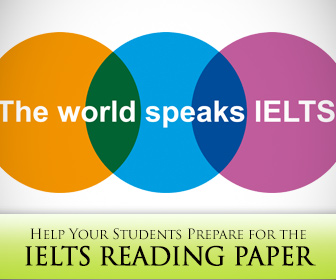
Students can be daunted when they first look at an IELTS Reading Paper; the sheer volume of text to be read and the sometimes technical vocabulary that it contains can cause panic in even the most conscientious students.
It can seem like an impossible task for students to attain the level of vocabulary, in such a wide range of topics, to enable them to answer the questions. These tips are tried and tested methods that can help students to achieve good marks in this part of the exam.

Make Use of These Ideas to Asssist Your Students with IELTS Reading
-
1
There’s Too Much Text!
This is a common complaint when students see a Reading Practice Test for the first time and they’ve got a point. The first thing a teacher should do is explain that to focus on reading specifically to answer the questions is the key. In order to do this, techniques can be learnt so that students can zero in on the exact part of the text they need to answer the questions. I always tell students that they should not read the whole text but look at the questions first.
-
2
Let the Headings Help You
The first thing to look at is the heading. The heading will give students an idea of what the article is going to be about. If it is a question the text is going to answer that question and that is likely to be the main focus of the text. There may also be a sub heading that will give further invaluable information. If they focus on the heading first students will immediately have an idea of what the gist of the text will be.
-
3
How Do You Write Essays?
This may seem like a strange question to ask students who are preparing for a reading paper however it is a valid one. Essay structures are also going to be used for the texts in the reading paper so they will have an introduction and a conclusion with problems/solutions, advantages/disadvantages contained within the body of the text. Looking at the first paragraph and the last paragraph will help your students understand the text.
-
4
Key Words
Of course key words are an essential part of any reading paper but students may need direction to identify what are the most helpful key words. By the time they do this they should already have an idea of the subject matter so the main focus here should be on the type of information they need to answer the question. For example if ‘not’ is in the statement they will be looking for a negative, quantity indicators such as ‘few’ or ‘all’ will be important in answering the question and time references such as ‘already’ will give students an indication of whether the answer is going to be a future or past event. These words will often be overlooked by students but they are vitally important in getting the information they need to answer the questions.
-
5
Paragraph Heading Matching
Make sure students get into the habit of immediately crossing out paragraphs and headings used in the Example. The next step should be for students to look at the remaining headings and put them in groups of headings that are similar. They can then look at the differences in the groups; for example one heading may be positive and another negative. Grouping the headings in this way will cut down the time needed to match them. They should then skim read the text to isolate the paragraph that matches one group of headings at a time focusing on the differences within the group to find the correct heading.
-
6
True, False or Not Given
This type of question can create difficulties for students particularly in respect of the ‘Not Given’ answers. One way of clarifying meaning is to ask your students to turn the statement into a question; students can then decide if the text answers the question, contradicts it or is opposite to it or whether it doesn’t actually give any information relating to the question. If the statement contains proper nouns, like the names of people or place names, this will help your students to find the relevant part of the text quickly.
-
7
Finding the Right Part
It can be tempting for students to pounce upon a paragraph if they find their keywords and get stuck there. Emphasize that they should keep looking through the text until they find all the paragraphs that contain those key words. They can then look at each part individually for meaning.
-
8
Synonyms are Essential
Being able to locate parallel words in the text and the questions is a vital part of the reading paper. At the beginning of an IELTS course students should be encouraged to look for synonyms whenever they learn a new word. Growing their vocabulary in this way will mean that their bank of synonyms will help them identify relevant text in the reading paper.
-
9
Summary Completion
Students will have to complete a summary of the text using words given. These words will usually be paraphrased in the text. Students should first of all read the summary and decide what type of word is needed; is an adjective missing or a verb. They can then choose the correct form from the words they have been given and locate the parallel word in the text.
All of these tips will help your students to get good results in the Reading Paper.
Giving them the techniques they need to identify relevant text will build their confidence in tackling an IELTS Reading Paper.
P.S. If you enjoyed this article, please help spread it by clicking one of those sharing buttons below. And if you are interested in more, you should follow our Facebook page where we share more about creative, non-boring ways to teach English.







